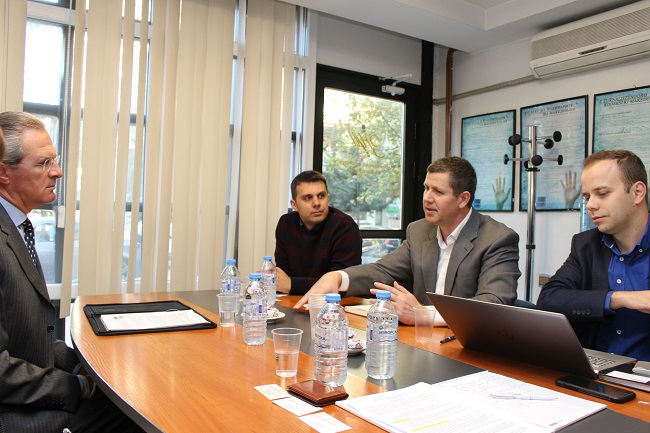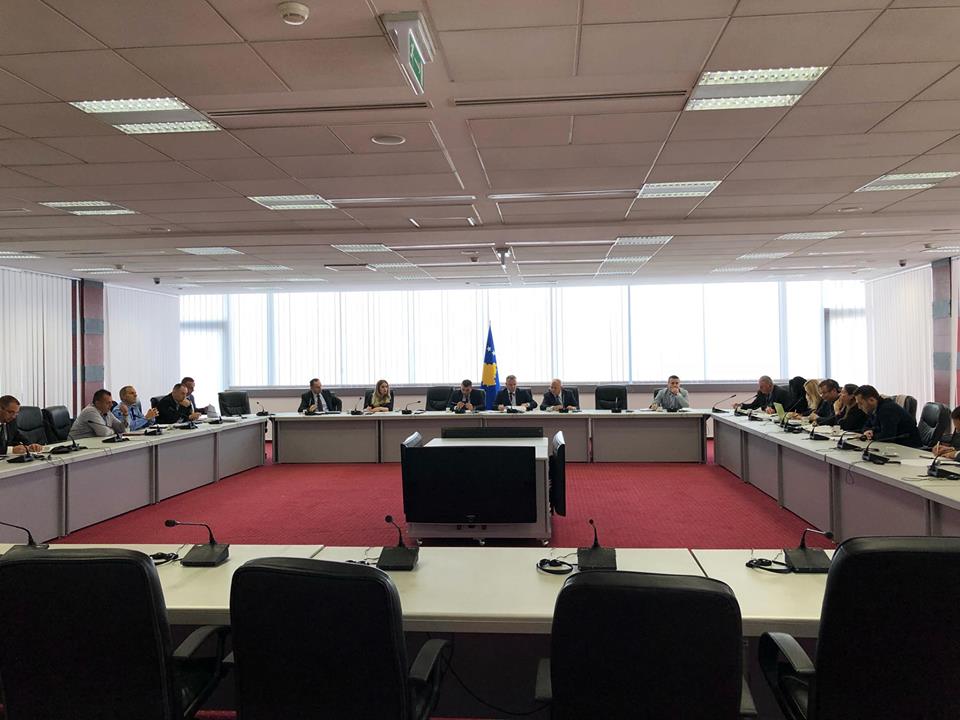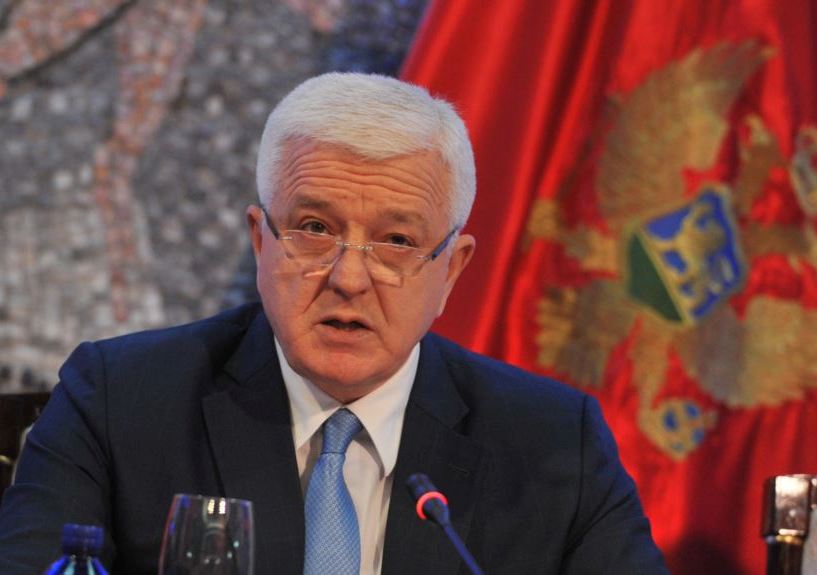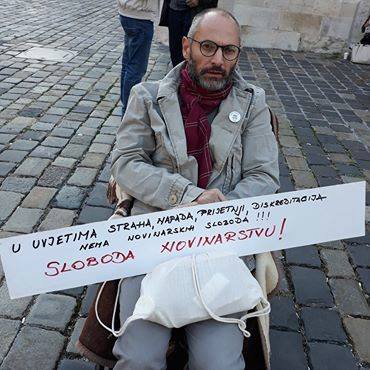BELGRADE, 22.10.2018. – Wishing to inform the international community about the recent development in the media scene in Serbia, the coalition of five journalists and media associations sent the following letter to relevant organisations and institutions.
Dear colleagues,
We wish to inform you about the key issues, problems and processes related to media and media freedom in Serbia today and to explain our views and attitudes, as well as arguments we based them on.
The information provided here will help you fully understand the complexity and stratification of the problems faced by Serbian journalists and media, as well as the citizens, whose constitutional right to be informed truthfully, comprehensively and timely informed about matter of public interest is seriously violated. We would also like to explain in more detail the role of media and journalists’ associations in media processes, especially those related to the dialogue with representatives of the authorities.
Despite a very difficult, we could say dramatic, situation in the media, the associations are always ready to have a dialogue and cooperate with representatives of the authorities if that leads to solving problems. We started cooperation with the Serbian government in June this year on creating the Media strategy, having been given firm guarantees by the Prime Minister Ana Brnabić that there was an unwavering political will among the authorities to improve the situation in the media and to cooperate with relevant journalists’ and media associations in order to achieve that goal. We would like to remind you that in the period preceding our cooperation, the authorities tried to create the Media strategy, but all relevant journalists’ and media associations withdrew from the process dissatisfied with the methodology and possible outcomes. A few months later, as a result of pressures, the Serbian government stopped this process and elevated it from the level of the Ministry of Culture and Information to the level of the Serbian government. OSCE was invited to facilitate the process, while journalists’ and media associations were asked to contribute by delegating members of the task force for designing the Media strategy. That is good news is that this document is being drafted at the moment and, despite certain problems, it is a widely inclusive process, which is satisfactory.
However, bear in mind that the Serbian government is supposed to adopt this document and that it can undergo major, even substantial, changes in comparison to the draft, which will be submitted to the government by the Working group. What is more important is that this document itself does not mean much, even if its quality is exceptional – it merely represents a promise of the Serbian government to adhere to it during a future period. Large number of strategic documents in Serbia has remained nothing but a list of nice, yet unfulfilled wishes.
It is only after the Media strategy is adopted that the process of amending the existing or creating new laws will begin. It is important to note that three years passed from the moment the Media strategy was produced to the moment the laws were adopted by the parliament (2011-2014). To be honest, we are afraid that a large number of professional media in Serbia will not last long enough to see the new laws; especially media exposed to great and varied political and economic pressures.
An issue greater than passage of time is the fact that the problems in the field of media in Serbia are only in small part a result of imperfect legal solutions – they are mostly a result of violations and mocking the law, i.e. lack of the rule of law. In practical terms, it means that even if we get excellent laws, it will not mean anything, nor can it be guaranteed that the situation in the field of media will improve. Namely, even the existing laws regulating media have been evaluated as positive by international stakeholders and experts. Yet, four years later, we have, and all relevant analyses, research and reports testify to that fact, the same dramatic problems in the world of media market, media freedom and media pluralism.
We would also like to remind you that Serbia received high appraisals from relevant institutions in the process of European integrations for the media laws of 2014. We believe that you understand our concern that the goal of the authorities now, just like in 2014, is not to improve the situation in the media, but to present the state of affairs in Serbian media to the international community in a light that does not reflect reality. We would like warn if the possibility that the authorities in Serbia present the process of drafting the Media strategy as a giant leap forward and that they might use it to divert attention away from all other problems in the media.
It is because of this concern that we requested from the authorities to initiate a process parallel to the process of drafting the Media strategy, in which we would jointly work on fast-tracking solutions to a number of media-related problems in the existing legal framework. Having reached an agreement, journalists’ and media associations formed a Team for the dialogue, while the Serbian government established the Coordination body, thus creating a platform for negotiations. The associations entered the process hoping to help overcome current problems in the field of media and that the results would be visible in a relatively short period. Unfortunately, four months after the dialogue began we still do not have a single proof, spoken reassurances aside, that there is a genuine political will on behalf of the authorities to improve the situation in the field of media and media freedom, which seriously questions the usefulness of the initiated dialogue. At the same time, the problems related to media are becoming more complex and numerous on a daily basis, thus creating extremely negative effects on the media, journalists, media freedom and media pluralism.
On August 16 2018, journalists’ and media associations submitted to the government’s Coordination body 13 requests for solving the key issues in the field of media, wishing to see if there was really political readiness to solve them. We did not set a deadline for the realisation of requests, because we were fully aware that some of them required more time, but we expected to receive adequate answers, which would indicate the readiness on behalf of the Coordination body to fulfil them, naturally with our help and support. Unfortunately, we have so far received nothing but partial, incomplete answers that we are absolutely not satisfied with. We have decided, as agreed on the previous meeting between the Team for the dialogue and the Coordination body, to further specify our requests, prioritise them and set deadlines. Should the deadlines not be met – and they are realistic and not too demanding – we retain the right to withdraw from the dialogue, as well as to reconsider our participation in the Working group in charge of drafting the Media strategy.
As we have already stated, parallel to these processes, the situation in the field of media is becoming increasingly difficult. Representatives of the authorities publicly call names, insult and humiliate journalists and media workers, labelling them as enemies of the society or “foreign agents”, thus seriously jeopardising their safety. There are many examples of such behaviour, the most recent one was the attack of the Head of the Parliamentary Group of the ruling Serbian Progressive Party Aleksandar Martinović on the President of the IJAV Nedim Sejdinović, whom he called an “enemy of Serbia” from the podium in the National Assembly for making critical comments about the authorities in Serbia. This was not the first time Martinović had called out a journalist by name. He had already called out Sejdinović’s name before, who received a large number of death threats as a result, all of which were reported to the police, but no court proceeding has been initiated. A few days ago an official from the Security Information Agency (BIA) Marko Parezanović stated that the “greatest threat to Serbia are the foreign agents working in media, non-governmental agencies and opposition parties”, while the Serbian president Aleksandar Vučić supported the claim. As we have stated, there are many cases of representatives of the authorities attacking the “disobeying” media and journalists. In its online database , the Independent Journalists Association of Serbia recorded 72 cases of calling out, insults, degradation and discrimination of journalists, media, journalists’ and media associations by the politicians and public officials.
The latest incident took place on 19.10.2018 when the President of RS Aleksandar Vućić first called a public service broadcaster by her name and insulted and humiliated her, and then turned to TV N1 journalist who had asked him not to put pressure on colleagues from the PSB (see transcript in English here).
Serbian authorities abuse various inspection services to put pressure on the media. “Vranjske” daily were closed in September 2017, was subjected to political, economic and administrative pressures, while the owner and Editor-in-chief Vukašin Obradović went on a hunger strike. Journalists, media and civil society organisations protested for months because of this, but to no avail. The latest case from Niš, the “Južne vesti” case, is also very disturbing. Namely, the Tax administration spent six months in this small media company and, even though it had conducted its business in compliance with the law, fined it. Representatives of the Tax administration abused their position in various ways in order to cause damage to the company.
Representatives of Serbian authorities often sue media companies and journalists, while court decisions are not in line with the laws in Serbia and practice of the European Court of Human Rights, which envisage that public officials are obliged to be subject to critical opinion. The fines make the already difficult situation even less bearable for the media that are not close to the authorities. On the other hand, despite being at the receiving end of threats and other forms of pressures, journalists do not have the adequate legal protection. The police, public prosecutor’s offices and courts are utterly inefficient when it comes to such cases, so the attacks on journalists remain unsolved and unsanctioned. We would also like to remind you that Serbia has still not seen court epilogue of murders of journalists that happened 15 and more years ago. On the other hand, state bodies in charge show a high level of efficiency when the targets of threats are representatives of the authorities. In such cases, the offenders are quickly found and sanctioned.
The tabloid print media are increasingly breaking the Serbian Journalists’ Code of Ethics, as confirmed by the reports of the Press Council. It is important to note that the media that break the Code the most are those closest to the authorities and they are in large part financed from public revenues. Those media spread hate speech, call names and insult those critical of the authorities, as well as citizens of other nationalities and confessions. The authorities have completely blocked and stultified the work of the Regulatory Authority of Electronic Media (REM), which is why chaos and lawlessness rule the field of electronic media. The media with national coverage have been turned into propaganda tools, with programmes of extremely low quality dominating the field. The Regulatory Authority is not reacting, even though the realised programmes are completely different from the submitted proposals, i.e. suggested work plans that the stations submitted when applying for frequencies. REM is not reacting even when it comes to a striking example of a breach of the Law on Electronic Media, i.e. when certain TV stations with national coverage broadcast live the sessions of the main board of the ruling party.
The case of the national news agency Tanjug is one of the most famous cases of breaching the law and endangering the legal system in the country. This agency is still actively working, even though a decision to close it down was made, pursuant to the law, on October 31, 2015. This agency is now a propaganda tool owned by the state, although the state decided to pull out from owning any media, pursuant to the laws of 2014. Furthermore, the state is, unlawfully, a co-owner of daily newspapers “Večernje novosti” and “Politika”, while the local self-government in Kragujevac is, also unlawfully, a co-owner of the previously privatised Radio-television Kragujevac.
Truth be told, Serbia is allocating extremely large amounts from the budget to the media, but completely non-transparently, selectively and discriminatorily. The laws allow the state to intervene financially in some rare cases and by co-financing projects of public interest. However, it is allocating enormous amounts through other means (public procurements, promotions, advertising, sponsorships, contracts on business and technical cooperation) in a way that is completely deregulated, as highlighted by the Anti-Corruption Council. In its report, the Council pointed out that the decisions made by political and economic elites on where to advertise and how much money to spend directly influenced the future of media companies. In order to attract advertisements, Council claims, the employees in such media companies try to create content which are in line with the interests of advertisers, thus neglecting the Journalists’ Code of Ethics, i.e. the ethical principles of their profession. It is with this intervention that the funds are allocated to the media close to the authorities, thus creating a serious imbalance on the media market and discriminating against “inadequate” media. No-one knows exactly how big these amounts are (one of our requests is to have the Coordination body submit a report on it, but the state is allegedly unable to obtain this information), but we are definitely talking about dozens of millions of euro annually. This is one of the most efficient recipes for controlling the media, where you subject them to both corruption and blackmail at the same time.
When it comes to competitions for co-financing projects of public interest in the media, we have been experiencing serious problems for years now. Although the law stipulates that the allocation of funds should be entrusted to media experts delegated from journalists’ and media associations and that the funds should be used in the interest of the public, this authority have turned this process into financing the media close to them and self-promotion. The funds are allocated to the media that have repeatedly broken the journalists’ Code of Ethics, even though it is one of the basic criteria for fund allocation.
We would like to remind you that the European Commission’s 2018 Report on Serbia contains a very negative assessment of the situation in the media, where the highlighted problems are the lack of transparency in ownership structure, the state’s co-financing of media and the consequent influence on not only the media, but the freedom of expression in general. The focus is on co-financing the issues of public interest in the field of information, the model of state’s financial intervention in the field of media envisaged by the Law on Public Information and Media of 2014, as well as “the distribution of advertising funds“. The report states that Serbian authorities should ensure that informal pressure on editorial policy is not exerted through the distribution of advertising funds, including from public companies, as well as through project co-funding from local budgets.
The public broadcasters in Serbia do not obey their legal obligations, which state that they should work in public interest and report truthfully, unbiasedly and comprehensively and that they should have independent editorial policies. Researches have shown that the public broadcasters are places from which public dialogue and critical thinking have been ousted and that their news programmes are dramatically dominated by the executive authorities. We would like to remind you that two years ago many editors were removed from their positions at the Public Broadcasting Service of Vojvodina for political reasons, that the situation in this company has remained unchanged, despite the protest of journalists’ and media associations and international organisations, and that this public broadcasting service is also weakened by other numerous affairs.
A huge problem for journalists’ and media organisations is the fact that there is a huge political pressure on the institution of the Commissioner for Information of Public Importance. Since 2015, the authorities have ignored 601 decisions of the commissioner related to the complaints submitted to the commissioner because of the infringement of the right to have free access to information. This is a staggering fact. We are certain that you are fully aware how important the instrument of free access to information is to journalists and media.
Unfortunately, this is just a brief overview of the most significant problems that the media in Serbia, as well as we, journalists’ and media associations, and citizens of Serbia are facing. We hope that this overview clarifies why we evaluate the situation as dramatically bad.
We also hope that, having read this, you will better understand our doubt that there is a political will among the authorities to solve the problems in the field of media within the scope of the process of the accession of Serbia to the European Union.
Independent Journalists’ Association of Serbia
Independent Journalists’ Association of Vojvodina
Association of Local Independent Media – Local Press
Association of Independent Electronic Media
Association of Online Media











